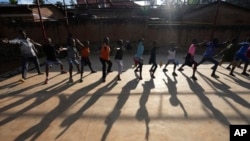Diggers scraped at the brown soil with hoes, looking for — and often finding — fragments of human bone. The women then wiped the bone fragments with their hands while others watched in solemn silence.
Excavation continues, a scene that is becoming all too familiar in a verdant stretch of rural Rwanda in southern Rwanda. In October, human remains were discovered at a house site under construction, sparking a new search for mass graves where the victims were believed to be buried. The 1994 genocide against the Tutsi in Rwanda.
In the months since, Rwandan authorities said the remains of at least 1,000 people had been found in this farming community in the Huye region, a surprising number after three decades of government efforts to provide dignified burials for genocide victims.
As Rwanda prepares to mark the 30th anniversary of the genocide next week, the continued discovery of mass graves is a stark reminder not only of the country’s determination to reconcile with its grim past, but also of the challenges it faces in achieving lasting peace.
The head of a prominent genocide survivors group and several other Rwandans told The Associated Press that the findings underscore that more needs to be done to achieve true reconciliation.
Rwanda has made it a criminal offense to withhold information about previously unknown mass graves. For years, perpetrators of the 1994 genocide, including those who were released after serving prison terms, have been urged to speak out and tell what they knew.
However, mass graves are mostly discovered by accident, leading to new arrests and re-traumatizing survivors.
The discovery in October led to the arrest of 87-year-old Jean Baptiste Hishamunda and four of his relatives.
After the remains of six were found under his home, excavation crews began searching his entire property, and as the search expanded to other locations in Huye, dozens and even hundreds of remains were discovered.
In 1994, an estimated 800,000 Tutsis were killed in an extremist Hutu massacre that lasted more than 100 days. Some moderate Hutus who tried to protect members of the Tutsi minority were also targeted.
On April 6, the plane carrying Hutu-majority President Juvenal Habyarimana was shot down in the capital Kigali, triggering the genocide. Tutsis were blamed for shooting down the plane and killing the president. Enraged gangs of Hutu extremists, backed by the army and police, began killing Tutsis.
The government of President Paul Kagame, whose rebel group stopped the genocide and whose party has ruled the East African country since 1994, is trying to heal ethnic divides.
The government instituted harsh criminal laws to punish the genocide and outlaw the ideology behind it, and Kagame fostered a culture of obedience among the country’s 14 million people. Rwandan identity cards no longer identify a person by ethnicity, and lessons on the genocide have become part of the school curriculum.
Hundreds of community projects, supported by the government or civil society, focus on uniting Rwandans as the country joins together to celebrate the anniversary of the genocide every April.
Today, serious crimes motivated by racial hatred are rare in this small country where Hutu, Tutsi and Twa ethnic groups coexist, but signs of what authorities say is a genocidal ideology remain and are being used to conceal information about the future. Take, for example, information about discovered mass graves.
Naphtal Ahishakiye, executive secretary of Ibuka, a Kigali-based group of genocide survivors, said villagers sometimes ask mass grave investigators whether they are looking for valuable minerals or Dumping of dog carcasses at memorial sites.
“It’s like saying, ‘What we lost during the genocide were dogs,’” Ahishakiye said.
He said there are still people who refuse to come forward and say what they witnessed. “We still need to improve, teach, get to people until they can tell us what’s going on.”
As more mass graves were discovered, Tutsi survivors “began to doubt” the good intentions of their Hutu neighbours, he said. Their requests for information about relatives killed in the killings went unanswered.
In the village of Ngoma, where lush farmland is dotted with shacks with corrugated roofs, diggers found rotting shoes and tattered clothing among skulls and bones. Survivors are retraumatized.
“I’m trying so hard to forget,” Beata Mujawayezu’s voice cracked as she recalled the murder of her 12-year-old sister at a roadblock on April 25, 1994.
The girl begged militiamen for her life and knelt before a gang leader, whom she called “my father.” She was struck with a machete.
“She was a lovely girl,” Mujavayezu said of her sister on a recent afternoon as she watched mass grave excavation work in the predominantly Tutsi neighborhood. “Hopefully one day we will know where she is buried.”
Augustine Nsengiyumva, another Ngoma survivor, said the newly discovered mass graves left him disappointed with his Hutu neighbors, whom he had come to trust.
“Imagine sleeping on genocide victims,” he said, referring to human remains found under people’s homes. “I really don’t understand these things.”
Young people are less haunted by the past. Some Rwandans see this as an opportunity for reconciliation in a country where most citizens are under 30 years old.
In the semi-rural district of Gahanga outside Kigali, farmer Patrick Hakizimana said he saw in his children a glimmer of hope that one day Rwanda would achieve racial harmony.
Haqizmana was a Hutu and army corporal during the genocide who was imprisoned from 1996 to 2007 for his alleged role in the massacres. He said he has learned his lesson and is now working to earn the respect of his neighbors.
“Some people still harbor hatred against the Tutsi,” he said. “The genocide has been in preparation for a long time.”
He said it would take a long time for people to overcome this hatred.
Follow us on Google news ,Twitter , and Join Whatsapp Group of thelocalreport.in

